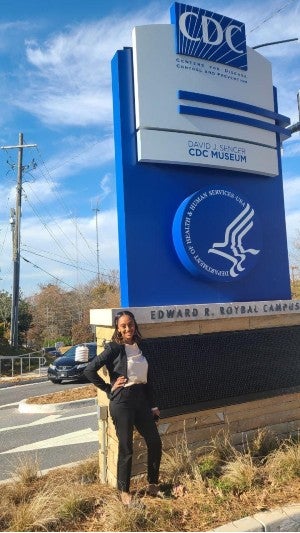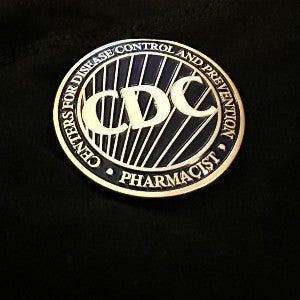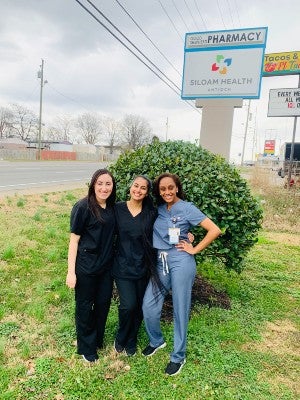Pharmacy student chosen for international task force on informatics
Sena Seged is already using her clinical training and informatics skills to make advances at the CDC and to help develop global informatics guidelines.
Janel Shoun-Smith |

When it came time to arrange for clinical practice experiences during her study of pharmacy and health care informatics, Lipscomb P4 Sena Seged (’19) decided to seek the very best.
Now, with one semester to go before graduation, she has secured experience at some of the most innovative health care technology companies (both in Nashville and elsewhere) as well as at the U.S. Centers for Disease Control and Prevention (CDC). Now, in 2022, she is a member of a Healthcare Information and Management Systems Society (HIMSS) two-year task force working to reform the global health ecosystem through the power of information and technology.
The HIMSS TIGER International Task Force (Technology Informatics Guiding Education Reform) was specifically interested in Seged’s informatics background, she said.
In general, most practicing health care informatics professionals start in health care and then return to school to complete advanced education and training in the informatics side.
Seged however, is graduating in May as both a clinically trained doctor in pharmacy and a master’s level proficient in health care informatics, with plenty of on-the-job experience.
So when HIMSS was looking for volunteer members for its TIGER task force to assist in developing a global pharmacy informatics toolkit for professionals, they viewed Seged as an ideal candidate with her combination of education and experience in pharmacy plus informatics.
Seged, a Hendersonville, Tennessee-native, is the only student on a 30-member task force, which has members from Emory Health Care, the Mayo Clinic, WHO, the CDC and other renowned health care organizations. Health care professionals across the nation will use the toolkit developed by TIGER over the next two years.
“Lipscomb is such a leader in the informatics field in the nation, and the HIMSS director recognized that. It is also a well-established program. It is great to see Lipscomb getting this recognition,” said Seged.
Seged had the opportunity to gain experience in many different settings for pharmacy informatics during her studies at Lipscomb.
It took more than a year for Seged to procure a month-long rotation in the medication safety department at the CDC, where she was able to observe and work with leaders from some of the most powerful and recognizable companies and organizations in the health care field.
“They select only a handful of students from across the country, because they want to provide opportunities for students who are really focused on public health,” said Seged, who hopes to one day practice professionally in the public health setting, hopefully at an organization like the CDC.
“They want to individualize those opportunities for students and give them attention so they will potentially stay on and work at the CDC,” she said of the rigorous process to obtain the rotation.

Seged did a rotation with the CDC in November.
In November, she spent a month working on national-scale efforts to prevent overdoses of over-the-counter medications. For part of her time with the CDC, she worked with the PROTECT Initiative (Prevention of Overdoses and Treatment Errors in Children Task Force).
For the rest of her rotation she used coding skills to organize and analyze 60 million rows of data on over-the-counter overdoses from 2014 until now, to discover the most commonly abused OTC medications reported on during that period. That information helped CDC officials create guidelines for medical professionals to help treat and prevent such overdoses nationwide, she said.
Before she arrived, her CDC mentors expected that project to take a year just to analyze the data, Seged said. Using her informatics knowledge gained through her master’s level studies at Lipscomb, she was able to synthesize all the data during her one-month rotation.
The database project was a source of great assistance to the CDC because its health professionals who work in the CDC offices, do not always have a strong knowledge of what happens day-to-day in the outpatient world, Seged said. By collecting, organizing and analyzing the data, they were able to see that melatonin, for instance, was one of the most commonly abused OTC supplements, and then use that knowledge to create appropriate guidance to assist medical professionals on these supplements, Seged said.
Having had rotations in ambulatory care and community care already under her belt, Seged was able to provide an on-the-ground viewpoint for the high-level health care leaders she worked with.

Seged's mentor at her CDC rotation gave her a challenge coin to remember her experience there.
At the PROTECT initiative, Seged was a medical scribe who kept track of interactions among leaders from Amazon’s Pharmacy division PillPack, the Federal Drug Administration, Johnson and Johnson, Pfizer and the World Health Organization (WHO), among others.
The PROTECT initiative focuses on preventing OTC overdoses in children, and the task force’s recommendations have already produced a 33% reduction in overdoses among children, Segad said. One example of a situation the task force discussed includes the recent trend of multi-dose packaging, which is convenient for patients, but does not use childproof packaging.
The CDC is not the first high-profile opportunity Seged has pursued with enthusiasm. In the summer of 2020, she spent a month at an internship at PEPID, an international health care information company based in Arizona.
At PEPID, she prepared patient information pamphlets for a database, and gave employees of the company an informational presentation on Novel Monoclonal Antibody (mAb) therapy for COVID-19. Seged worked to assure the quality of PEPID’s drug database by inputting new drug information while also updating and editing existing entries. Later, Seged completed an additional rotation with the company.

Sena Segad was one of many students volunteering at nonprofit clinics around Nashville.
She has also completed rotations with Amazon’s Pharmacy and at Lifepoint in Brentwood, Tennessee, where she managed formularies from hospitals to organize medications by billing code.
Seged believes a common misperception among young people going into health care informatics is that the field is more about technology and less about a strong clinical foundation. Her internships and rotations prove that is not the case, she said.
“It is about applying clinical knowledge with the use of information technology to improve patients’ health outcomes,” Seged said. “I saw what I was capable of and how much clinical knowledge I really knew when working at these experiences.”
Before entering the College of Pharmacy, Seged both volunteered and interned at the Dispensary of Hope in Nashville, a charitable medication distributor. The experience inspired her to find a way to use her “passion for using technology” to “help in patient care.”